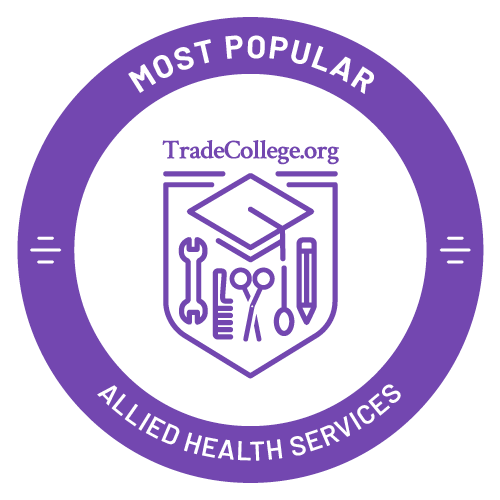Find Trade Colleges
2023 Most Popular Allied Health Services Bachelor's Degree Trade Schools in the New England Region
Finding the Best Allied Health & Medical Assisting Services Bachelor's Degree School for You
With 83,587 degrees and certificates handed out in 2021-2022, allied health & medical assisting services is the #3 most popular major in the United States.
There are so many trade school programs in today's world that it can tough to figure out which one is the right one for you. With more and more schools offering online options, you could even register for a great program on the other side of the country.
To help you arm yourself with the information you need to make your decision, Trade College Search has developed this Most Popular Allied Health Services Bachelor's Degree Trade Schools in the New England Region ranking. Our analysis looked at 3 schools in the New England Region to see which bachelor's degree programs were the most popular for trade school students. To create this ranking we looked at how many students graduated from the Allied Health & Medical Assisting Services program at each school on the list.
Featured schools near , edit
2023 Most Popular Allied Health & Medical Assisting Services Bachelor’s Degree Schools in the New England Region
Check out the medical assisting bachelor's degree programs at these schools if you want to attend one of the most popular in the New England Region .
Most Popular New England Region Trade Schools for a Bachelor's in Allied Health Services
Our analysis found University of Connecticut to be the most popular school for allied health & medical assisting services students who want to pursue a bachelor’s degree in the New England Region . UCONN is a fairly large public school located in the suburb of Storrs.
About 80% of the students majoring in medical assisting at the school are women while 20% are male.
On average, medical assisting graduates from UCONN take out $20,075 in student loans while working on their Bachelor's Degree. This translates to an average monthly loan payment of $369, based on a 10-year repayment plan.
You’ll be in good company if you decide to attend Anna Maria College. It ranked #2 on our 2023 Most Popular Allied Health Services Bachelor’s Degree Trade Schools in the New England Region list. Anna Maria is a small private not-for-profit school located in the rural area of Paxton.
Full Allied Health & Medical Assisting Services at Anna Maria College Report
The in-demand bachelor’s degree programs at Rhode Island College helped the school earn the #3 place on this year’s ranking of the most popular allied health & medical assisting services schools in the New England Region . RIC is a moderately-sized public school located in the large suburb of Providence.
Read full report on Allied Health & Medical Assisting Services at Rhode Island College
Best Allied Health & Medical Assisting Services Colleges by State
Explore the best allied health & medical assisting services schools for a specific state in the New England region.
| State | Degrees Awarded |
|---|---|
| Massachusetts | 875 |
| Maine | 300 |
| Connecticut | 933 |
| Rhode Island | 236 |
| New Hampshire | 47 |
| Vermont | 39 |
Allied Health & Medical Assisting Services Related Majors
One of 11 majors within the trade school area of study, allied health & medical assisting services has other similar majors worth exploring.
Medical Assisting Concentrations
Majors Similar to Medical Assisting
| Related Major | Annual Graduates |
|---|---|
| Health & Medical Administrative Services | 88,600 |
| Practical Nursing & Nursing Assistants | 85,339 |
| Allied Health Professions | 83,905 |
| Health Sciences & Services | 36,762 |
| Mental & Social Health Services | 30,331 |
Notes and References
*These averages are for the top 3 schools only.
- The Integrated Postsecondary Education Data System (IPEDS) from the National Center for Education Statistics (NCES), a branch of the U.S. Department of Education (DOE) serves as the core of the rest of our data about colleges.
- Some other college data, including much of the graduate earnings data, comes from the U.S. Department of Education’s (College Scorecard).
More about our data sources and methodologies.




